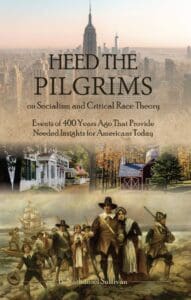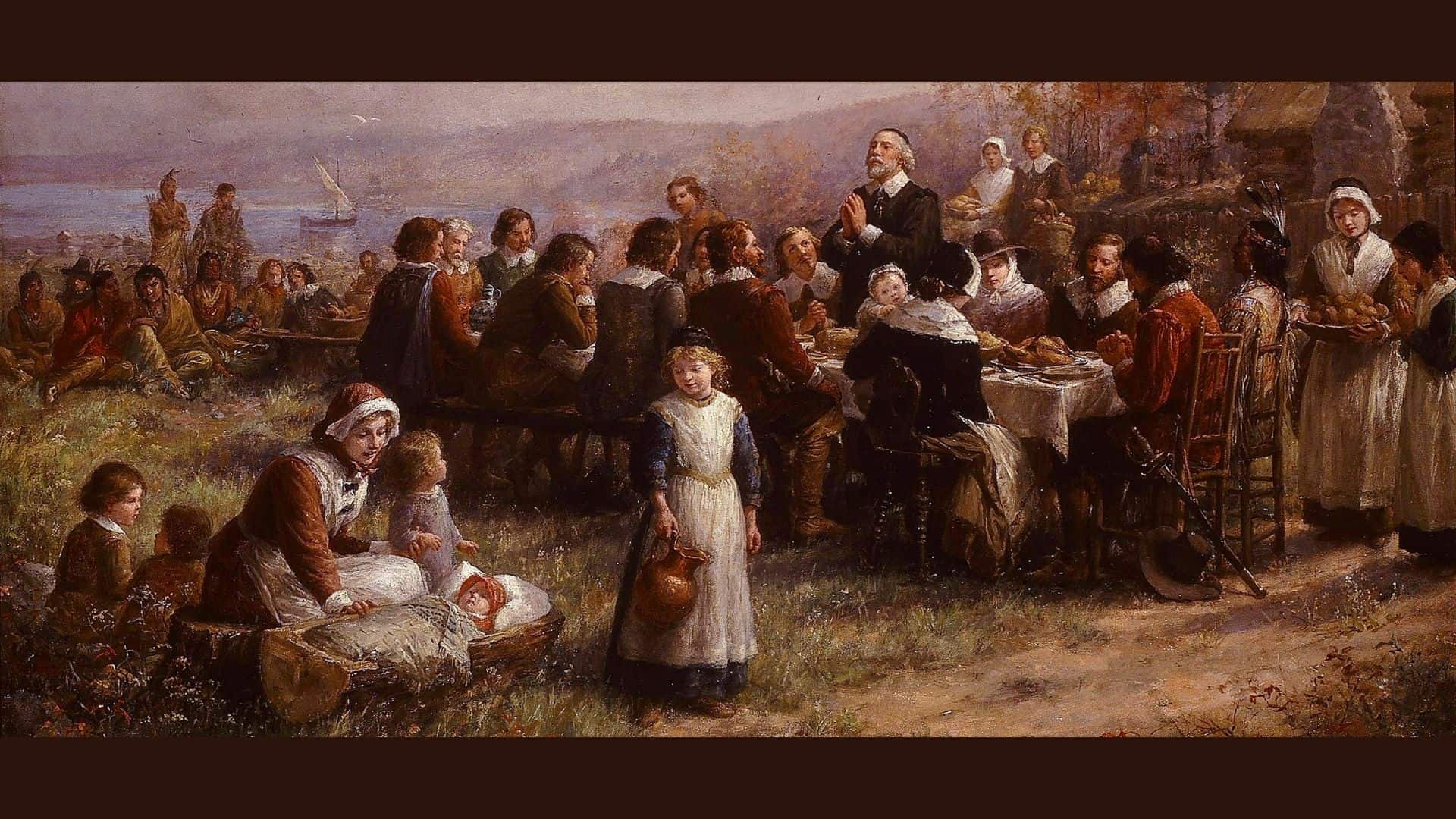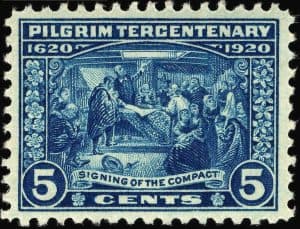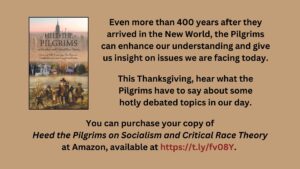[T]he face of things was changed, to the rejoicing of the hearts of many for which they blessed God.
—William Bradford, Governor of the Plymouth Colony—
The following discussion guide is offered as a resource for families and friends gathered together for Thanksgiving. You can use it to learn about and talk about some of the Pilgrims’ hardships during the first two years they lived at Plymouth. Also highlighted is an important victory they celebrated at the end of those two years.
 A PDF file of this guide is available for download here. You can print it off and use it in connection with this webpage, where the audio clips are showcased without the text of what is being read.
A PDF file of this guide is available for download here. You can print it off and use it in connection with this webpage, where the audio clips are showcased without the text of what is being read.
You may know that from 1621 to 1623, the Pilgrims lived under a communal arrangement that today we would call socialism. This discussion guide is based on a Word Foundations article titled “Ditching Socialism in the New World: A Lesson for 21st-Century Americans” and chapter 1 of Heed the Pilgrims on Socialism and Critical Race Theory. The article and chapter 1 of the book are essentially identical. They offer readers a contemporary paraphrase of William Bradford’s account of what occurred during the 2-year period Bradford and his fellow settlers lived under socialist policies.

An audio edition of “Ditching Socialism” is available for download here. It is eighteen-and-a-half minutes long and read by Micah Sample. You do not have to have read or heard the article to use the discussion guide; audio clips relating the most important elements in the story are provided below. The combined time for all eight clips is just over nine minutes.
Suggestion: After Thanksgiving dinner or at some other point during Thanksgiving Day itself or the holiday period, call everyone together and use this discussion guide to learn about and to explore what happened to the Pilgrims. We can more fully appreciate their attitude of thankfulness if we know the kinds of challenges they had endured. Listen to each audio clip, then use the suggested discussion items to share reactions and insights. Ideas for discussing the content covered in the audio clips have been intentionally designed to be brief; however, more lengthy conversations can occur if your group would like to have them.

A reasonable amount of time to allot for this exchange of thoughts and ideas between family and friends is about 30 minutes. Try it! You’ll learn, not only about the Pilgrims, but also about history, freedom and liberty, and biblical teachings on work, responsibility, and gratitude. In addition, some misconceptions and myths about socialism — an increasingly popular ideology today — just might fade under the light of truth. Keep in mind, though, that this is a time to learn and share about what happened to the Plymouth settlers and why, not a time to argue!
Special note: Don’t be intimidated by the length of this discussion guide. The complete texts of all the audio clips appear here in their entirety, and this, of course, adds to the length; but the clips themselves actually are quite short. The time will move rapidly.
Clip #1
The Mayflower Compact — Societal Order Is Important
length of clip: 1:43 (sometimes the readings on the audio bands are inaccurate)
Our congregation of believers left England and moved to Holland so we would be able to worship God freely; then, after 11 or so years, we felt compelled to leave Holland because we were concerned about how the culture was affecting our children. We departed for the New World in 1620, and later in the year than we ideally would have due to circumstances beyond our control. Our arrival here came after a rough ocean crossing on the Mayflower. We landed at Cape Cod in the New World on November 11, 1620. Before we even began to explore the land, we knew there was an important matter of business we had to address.
We were keenly aware that chaos would erupt if we didn’t live together in harmony, so we drafted what is now known as The Mayflower Compact. It was our statement that we would unite in one “Civil Body Politic” and obey the laws that were enacted. Unity and harmony had to be preserved. If we didn’t stick together, we wouldn’t survive!
Discuss: Governor Bradford wrote, “Unity and harmony had to be preserved. If we didn’t stick together, we wouldn’t survive!” Ask the members of your group to describe how important it was for order to be maintained. Ask: What were some of the risks if laws that were made were not respected and obeyed?
Clip #2
The Communal Arrangement — The Guidelines
length of clip: 0:57
A number of investors in London had financed our voyage to the New World. In turn, they required us to work for them five days out of each week; the remaining two days per week we would be allowed to work for ourselves. After seven years, all profits would be divided equally between us and them. During the five days we worked for them, all our resources had to be held in common. In other words, no private property! No one owned any land or resources of his own. Whatever our team of workers generated had to be put into a common store, and individuals would take what they needed for their livelihoods from that same pool.
As I said, for two years we operated this way. We faced obstacle after obstacle. Those who worked did so begrudgingly, and many would offer excuse after excuse not to work at all.
Ask: Without private property, why might more people than usual try to dodge work? Discuss, then say: Let’s see what Bradford had to say.
Clip #3
The Communal Arrangement — The Injustices
length of clip: 1:26
Here are some examples.
-
- The young unmarried men—those who were strongest and who had the most time and the greatest ability to produce—resented that they were, in effect, being made to work for other men’s wives and children, without any additional compensation.
- Whether strong or weak, everyone working, whether he did much or little, would wind up with the same amount of food and other resources as everyone else. If an individual worked a full eight hours in a day, and another worked only two, each received the same. Those carrying the greater load strongly believed this to be an extreme injustice. Can you blame them?
- Experience counted for nothing; the older men felt disrespected by those who were younger.
- Under the communal arrangement, the wives had to cook and do laundry for anyone and everyone—not just their own husbands and families. This angered husbands, who, along with their wives, felt this was a form of slavery.
All of this was bad enough, but I’m convinced it would have been a lot worse if we hated each other. No one in our congregation was perfect—not by a long shot. Still, we were a people who had common goals and who sincerely wanted everyone among us to have the best. Our company had more than its share of honest and decent men and women.
Discuss: Why weren’t the mutual friendships and camaraderie that existed among the Pilgrims enough to make the communal system work?
Clip #4
The Emotional Appeal of Socialism — And the Harsh Reality that it Doesn’t Work
length of clip: 1:13
Sharing resources sounds so compassionate and compelling. It has a great emotional appeal. Operating this way, however, set us at one another’s throats. It bred resentment, disrespect, ill will, selfishness, envy, and greed. It was a dead end that would have killed us all.
On reflection, I have become convinced that it wasn’t our fault that this plan didn’t work. It didn’t work, and it doesn’t work, because it is a faulty plan! The communal system, which today is often called socialism, does not fit human nature, and it will fail wherever and whenever it is tried. Few things in this life are more certain.
This plan works only in socialists’ minds! Oh, they may sincerely believe that eliminating private property and putting the state in charge of producing and managing everything will create a utopia—but it never will. This idea is a complete fantasy. Socialists actually are pretending to be wiser than God! We are grateful that God showed us a better way.
Discuss: What about human nature conflicts with socialism?
Clip #5
Changing Direction
length of clip: 1:25
We knew we couldn’t continue on as we had. Had we done so, all of us would have starved to death. We discussed it thoroughly among ourselves, considering all our options. In the end, we decided that I as governor, taking into account the advice given by the other leaders among us, would assign a tract of land to each family. Each one, in turn, would be responsible to plant corn and other crops for themselves.

In other words, we ditched the communal system. Our investors simply would have to live with that! What kind of return on their investments would they receive if all of us had starved? We traded the failed system for one that emphasized
-
-
- the benefits of private property and
- the responsibilities of the owner or owners to effectively manage the resources in his or their charge.
-
Ask: How can having the right to own and manage property and assets motivate an individual to engage in responsible and productive work? What are some Bible stories or passages that talk about ownership and stewardship of property and assets? Here are a few suggestions: Proverbs 12:11,24; 14:23; 21:5; Matthew 25:14-30. If your time is limited, read and briefly talk about Proverbs 12:11,24.
Clip #6
A Lifesaving Way
length of clip: 0:34

The change was remarkable and immediate! Whereas before the men in our company had looked for excuses not to work and had complained when they did, they now labored willingly and eagerly. More corn was planted than would have been under any other system I or anyone else could have devised. It wasn’t just the men, either! Wives and children also worked in the fields, and they apparently wanted to! Before we adopted this system, urging a woman to till the ground and plant corn was thought to be oppressive and mean.
Share that Deuteronomy 8:18 says, “And you shall remember the Lord your God, for it is He who gives you power to get wealth, that He may establish His covenant which He swore to your fathers, as it is this day.” Point out that a biblical perspective on wealth and prosperity affirms becoming prosperous through hard work. Thus, becoming wealthy through diligent work is not sinful. Note that once families were assured that the crops they worked to produce would be theirs, they wanted to work. When the Pilgrims didn’t have that assurance, they made excuses not to work.
But what about the poor? someone will ask. This is a great question! Scripture does not forget about the poor and the otherwise disadvantaged. It commands God’s people to assist them (see Ps. 10:2; 41:1; 82:3-4; Prov. 14:21,31; 19:17; 21:13; 22:9). Listen to Clip #7.
Clip #7
Free to Prosper, Free to Share
length of clip: 0:42

The tendencies to look out for oneself and to view others skeptically are natural. But the “other side of this same coin” is that with enough to go around, generosity can be encouraged and joyfully practiced. When a person has worked hard to meet his own needs and has a surplus, and when he experiences the satisfaction of hard work and the fruit of his labor, he is free to think about others and to give of his own resources to help them and to meet their needs. As Paul wrote in Ephesians 4:28, “Let him who stole steal no longer, but rather let him labor, working with his hands what is good, that he may have something to give him who has need.”
Discuss: According to Ephesians 4:28, what is God’s plan for meeting people’s needs? Answer: People work to meet their own needs. They obey God’s commands, including “Don’t steal” and “Don’t covet” (see Ex. 20:15,17). They also meet the needs of their own family members. From their resources, they help the poor. Note that government isn’t mentioned in this verse, or anywhere else in Scripture, as a vehicle for helping the poor, or as an entity designed to meet anyone’s needs, for that matter. Observe: Government’s job is to maintain order in society by commending those who do right and by punishing those who do wrong — according to God’s standard of right and wrong (see Rom. 13:1-7; 1 Pet. 2:13-17; 1 Tim. 2:1-2).
Clip #8
Thankful to God
length of clip: 1:08
After the newcomers joined us, it wasn’t that long until it was time to harvest our crops. We reaped a bountiful harvest that year, certainly because God had been good to us, but also because the members of the colony had worked hard in both planting and harvesting. In fact, we enjoyed more than enough! Some members of the colony even were able to benefit others because they had enough to sell. Also, through their transactions, they managed to benefit themselves as well by making a profit. Having worked hard, they deserved it!

With God’s help, we had turned a corner!
We knew we had a great deal for which to be grateful, and we celebrated that year, thanking God for all His abundant blessings!
Despite the hardships of the past, and despite other hardships that were yet to come, the future looked bright!
A new day had dawned!
I shudder to think what would have become of us if we hadn’t ditched socialism!
William Bradford
Governor of the Plymouth Colony
Observe: Working diligently to do well also means working diligently so one can do good and help others. However, the worker must never forget what Deuteronomy 8:18 tells us. God enables us to prosper by blessing our work.
Note that socialism does not acknowledge God or leave room to acknowledge God. Note the statements from Karl Marx cited below. Communism is socialism’s sister ideology.
Also share this: By contrast, under the free enterprise system, people are free not only to work hard and prosper, but also to recognize God’s blessing on their work and in their lives.
Say: That’s what they Pilgrims did in 1623, and it’s what we’re doing today.
Wrapping Up
Share that in an article appearing at hawaiifreepress.com, Jim O’Keefe writes that for two grueling years, the Pilgrims
had tried collectivism and, finding it destructive to human nature, had changed course.
The following November, 1623, saw a Thanksgiving Feast that was truly a celebration of abundance, a bounty created by the enterprise of free men and women, toiling on their own behalf and, in the process, creating a richer society. Today we call this system free enterprise, or the free market. Of all the things that have come down to us from the Pilgrims to today’s America, that is their most precious gift to us.
Of all the things that have come down to us from the Pilgrims to today’s America, the system we call free enterprise, or the free market, is their most precious gift to us.
—Jim O’Keefe—
Conclude: Today, we can thank God for this priceless gift. Let us also work to preserve it.
Copyright © 2021 by B. Nathaniel Sullivan. All rights reserved.
Unless otherwise indicated, Scripture has been taken from the New King James Version®. Copyright © 1982 by Thomas Nelson, Inc. Used by permission. All rights reserved.
All audio material available in this discussion guide copyright © 2021 by Micah Sample and B. Nathaniel Sullivan. All rights reserved.
top image credit: Jennie Augusta Brownscombe, Thanksgiving at Plymouth, 1925, National Museum of Women in the Arts




[…] Why the Pilgrims Were Especially Thankful in 1623: A Discussion Guide […]
[…] A discussion guide for families and friends to use as they explore the events described in this article is available here. […]